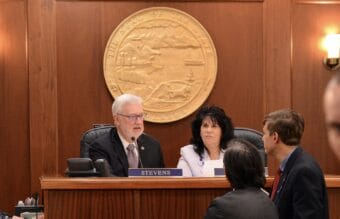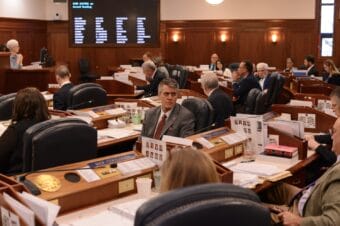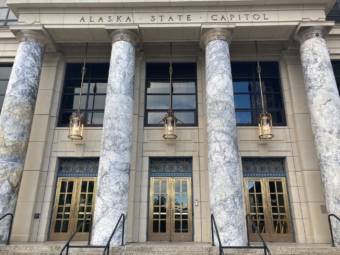
Alaska Gov. Mike Dunleavy is threatening to veto a key bipartisan education bill that would boost state spending on public schools by about a quarter billion dollars a year. Dunleavy says he wants lawmakers to address more of his priorities — like teacher retention bonuses, expanding charter school access and accountability measures.
Dunleavy has to sign or veto the bill by March 14, or it becomes law without his signature.
The governor’s priorities are getting a hard look in the Senate — but perhaps not the reception Dunleavy was hoping for. The Senate Education Committee dug into the state’s charter school system in a lengthy hearing Monday covering districts from Ketchikan to Nome.
“There doesn’t seem to be a good reason to fix a system that isn’t broken,” Fairbanks North Star Borough Board of Education President Brandy Harty told the Senate panel, referring to a proposal backed by Dunleavy that would bypass local school boards and allow the state board of education to directly authorize new charter schools.
Sen. Löki Tobin, D-Anchorage and chair of the Senate Education Committee, said the perspective was illuminating.
“Many of the folks who provided testimony reminded us that our education system … does not have a one-size-fits-all approach. We really try to provide choice to all of our communities and to our parents, and that there is a high value to local control, particularly in accountability and fiscal responsibility of use of state funds,” Tobin said.
Progress is less visible in the House. The House Education Committee has no meetings scheduled for the week — it hasn’t met since Valentine’s Day. And Dunleavy is in D.C. for Biden’s State of the Union speech. He’s a guest of Republican Arkansas Sen. John Boozman.
But Rep. Dan Saddler, R-Eagle River and the House majority leader, said there’s plenty going on behind the scenes. House and Senate leaders met with Dunleavy on Monday.
“There have been conversations between members of the House and Senate and the governor’s leadership to try and figure out how we may accommodate those interests,” Saddler said at a news conference on Tuesday. “Those are ongoing. There’s no results yet.”
Rep. Julie Coulombe, R-Anchorage, said negotiators are working towards common ground.
“The mood of the house this year is much different than last year,” she said. “There’s a consensus that we need to address education and the funding of education, so I don’t think we’re very far apart from the governor and from each other.”
But there are some sticking points. At his Feb. 27 news conference announcing the veto threat, Dunleavy suggested that there may not be enough money to fund everything in the education bill. About three-fourths of of the estimated $246 million cost of the bill comes from a $680 increase in the base student allocation, the per-student funding provided to school districts. It’s the first substantial increase in years.
“I’ve said this before. Everything that people would like to have put in the budget is probably not going to get funded,” Dunleavy told reporters. “And some of that may include some of these pieces. Not — trust me, there’s going to be a BSA. There’s going to be a substantial BSA. There just is. But we need to talk about our revenue, our resources to put behind these things.”
Dunleavy has broad power to reduce or zero out budget items with a line-item veto, and Senate President Gary Stevens, R-Kodiak, said that makes it difficult to give much ground.
“I’m really concerned that we are being asked to give up a lot without receiving some assurance that the student monies will not be vetoed,” Stevens said.
The bipartisan education bill passed with large majorities in the House and Senate — more than enough to meet the two-thirds threshold to override the veto Dunleavy is threatening. But several lawmakers, especially in the House, say it’s premature to speculate on whether they have enough votes for an override.
House Speaker Cathy Tilton, R-Wasilla, was the only House majority lawmaker willing to answer the question directly — and her answer was no.
“When I came off of the House floor, I said that this wasn’t everything that everybody wanted. As a matter of fact, it fell very short from what we were looking at as a majority caucus,” she said Monday. “So, people will have to vote wherever their conscience is.”
But Sen. Bill Wielechowski, D-Anchorage, said he’s optimistic.
“I think people have been talking in good faith. Everybody wants to get this behind us, I think. And hopefully in the next week we’ll have a definitive answer,” he said.



